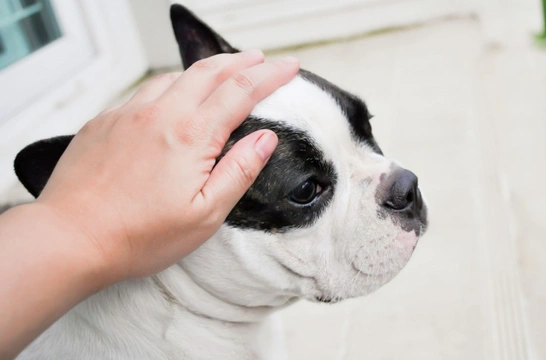
What does it mean if your dog growls when you pat them?
Growling is one of the most universally recognised vocalisations produced by dogs, and even people who do not spend a lot of time with dogs or know much about them instinctively know that growling means back off, and that a growl may escalate to a bite. A whole range of different scenarios and situations can lead to growling, and some dogs are much more communicative in this respect than others-some dogs rarely growl, even when unhappy, whilst others will not be shy to grumble away if something displeases them.
Growling when being patted or otherwise touched is not very common-and will usually only occur if you have decided to say hello to a strange dog (which you should never do without the owner’s permission) that does not know you, nor you them.
However, some dogs will growl and grumble regularly when you pat them-and this can be very confusing if it is your own dog, and especially if the dog in question also appears to enjoy attention and shows conflicting responses, such as growling whilst also nosing at you for more.
If your dog growls when you pat them or otherwise touch them, it is important to find out why this is and deal with the problem-because a dog should not growl when being petted, and there will always be a reason behind this, either physical or behavioural, which must be resolved.
In this article, we will examine some of the most common causes for your dog growling when you pat them, and how to resolve them. Read on to learn more.
Your own dog
First of all, it is important to note that if the dog in question is not your own, you should read the growl as a warning and back off immediately. Many dogs will growl if a stranger approaches them to pet them, because they may be wary, intimidated or not keen on contact from strangers-and it is up to that dog’s own owner to determine what is going on and sort it out. Your job is simply to avoid getting bitten, and to know your own dog well enough to be able to stand a good chance of properly assessing what this behaviour means for them.
Even with your own dog, you should be very wary and careful if they growl at you at any time and for any reason, and not simply assume that they will not snap or bite.
Pain or discomfort
The main thing that will cause your dog to growl when you pat them, particularly if this is a new behaviour, is that they are in pain or discomfort, or feeling ill. This is especially likely to be the case if the growling begins or escalates when you approach or touch a certain area of their body, but if your dog is suffering from an illness rather than an injury, it may not be localised in this way.
Before you begin to consider behavioural causes of the growling, book an appointment with your vet and explain the problem, and ask them to check it out.
Confusing growling with grumbling
Dogs can produce a grumbling sound that sounds very similar to growling, but is more muted and has a less threatening undertone to it. Some dogs will make this noise when they are really enjoying being petted, and this can be heard in virtually all dog breeds-but brachycephalic breeds that sometimes have noisy breath sounds like the pug are particularly likely to make this noise.
If your dog is leaning into your touch, keeping nudging you for more or is otherwise showing all of the other signs of enjoying the contact, they may be making a pleased grumbling sound rather than growling!
Stress and anxiety
If your dog is stressed out due to a certain situation or because they are generally stressed and don’t feel secure, the addition of touch stimulus that should be pleasurable may simply be providing another thing to think about that increases their anxiety.
If you know that your dog is anxious about something, like being in the waiting room at the vet or hearing a thunderstorm, sometimes touch will soothe them-but it may also give them something else to worry about that just adds to the stimulus and so, stresses them out more.
Overstimulation
If you have been playing with your dog, brushing them or otherwise focusing on them and giving them a lot of attention that involves physical touch, your dog may become overstimulated and oversensitive, and growl in an attempt to get you to back off and so, reduce the stimulus.
Improperly learned communication methods
Dogs have a wide range of different communication methods in their repertoires, including vocalisations and body language, which they use to communicate with both other dogs and with people. These methods of communication are partially instinctive and partially learned, and for dogs that are not used to people, have had bad experiences with people in the past or that have been poorly socialised, their communication signals can be confused and inappropriate to the situation and their mood.
This is not particularly common, but if you are dealing with a rescued dog, one with an uncertain history or one that you know has had problems in the past, it may be a potential explanation-and one that you may need to speak to a canine behaviourist about when it comes to resolving it.



